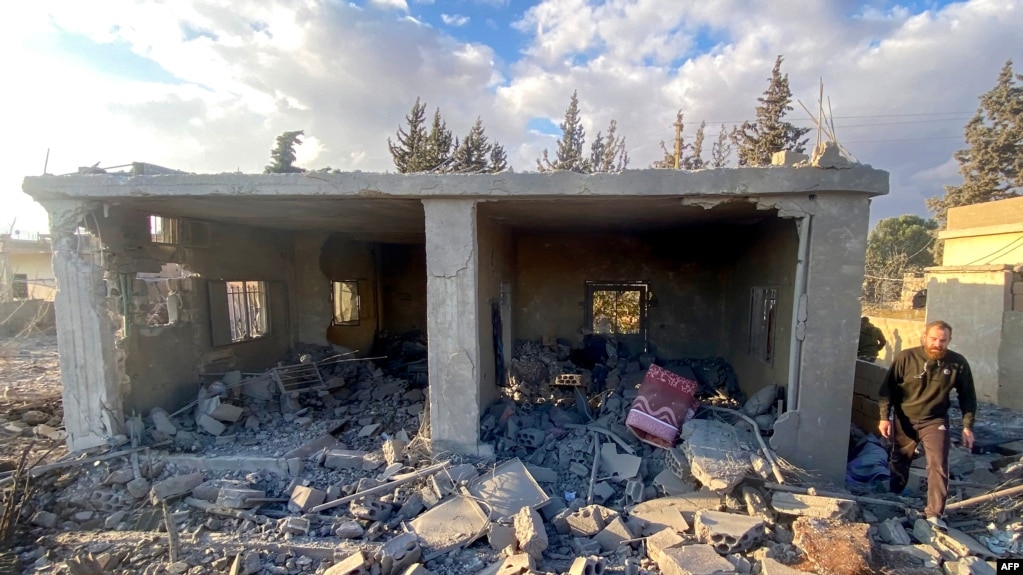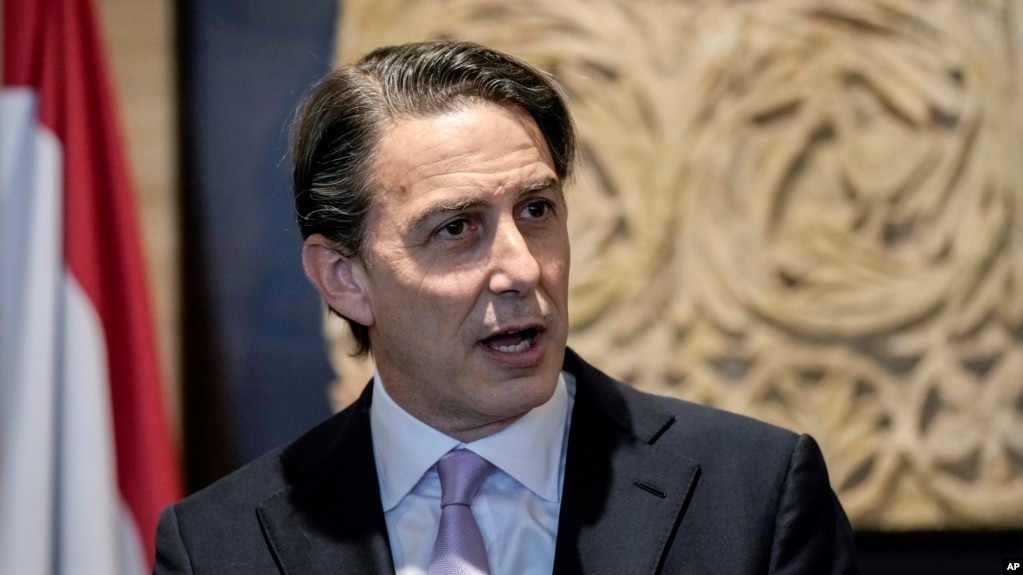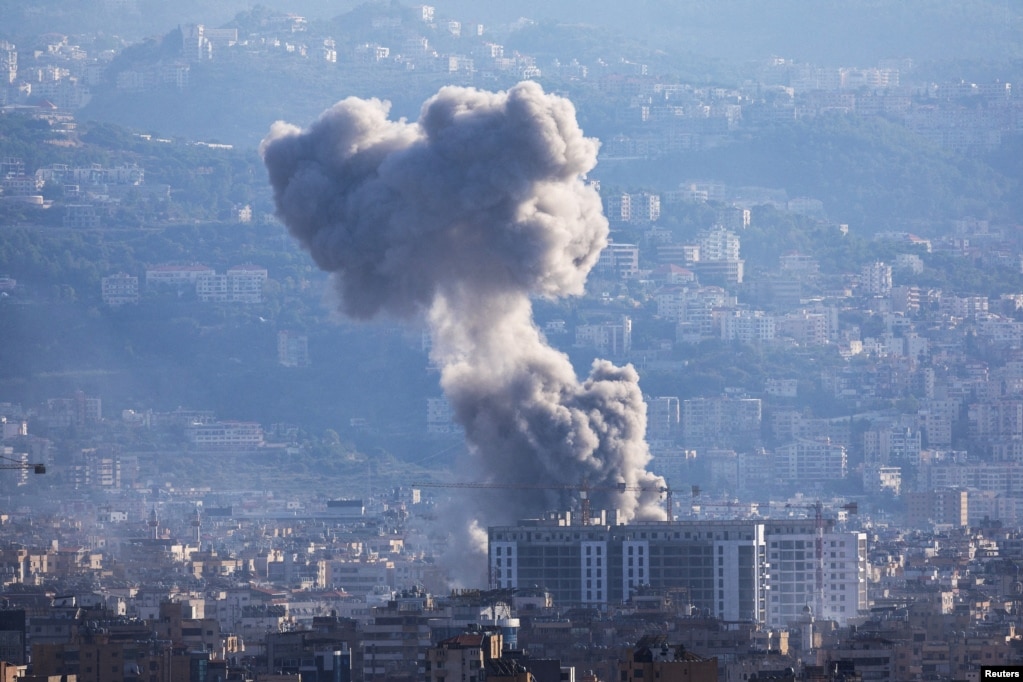
A man inspects the damage at the site of an Israeli airstrike that targeted the village of Makneh in eastern Lebanon, Nov. 21, 2024, amid the war between Israel and Hezbollah.
Dozens of people were reported killed in Israeli strikes in eastern Lebanon on Thursday. The governor of Baalbek-Hermel province said that at least 47 people were killed and 22 people were wounded in his region by the strikes.
The strikes on Thursday came a day after U.S. envoy Amos Hochstein left Lebanon for Israel amid a push to secure a cease-fire in Israel’s war with the Lebanon-based militant group Hezbollah
Hochstein met with Prime Minister Benjamin Netanyahu and Defense Minister Israel Katz but there were no immediate reports from the meeting.
However, a senior Lebanese official told Reuters that his country sought changes in the proposal to ensure the quick withdrawal of Israeli forces from south Lebanon.

Amos Hochstein, a senior adviser to President Joe Biden, gives a statement to the media after his meeting with Parliament Speaker Nabih Berri, in Beirut, Lebanon, Nov. 20, 2024.
Hochstein reported progress Wednesday in what he described as constructive talks this week with Lebanese officials, including Parliament Speaker Nabih Berri, a Hezbollah ally mediating for the militants.
Israeli forces continued their military campaign that Netanyahu says is aimed at pushing Hezbollah back from border areas in southern Lebanon where the militants could pose a threat to northern Israel.
Israel’s military issued new evacuation orders in southern Lebanon, in Beirut’s southern suburbs and in the Tyre area. Such calls for people to flee have frequently been followed by Israeli strikes that the military says target Hezbollah fighters.

Smoke rises from Beirut southern suburbs after an Israeli strike, amid the ongoing hostilities between Hezbollah and Israeli forces, as seen from Ashrafieh, Lebanon, Nov. 21, 2024.
Cease-fire resolution
The United States blocked a U.N. Security Council resolution Wednesday, demanding a permanent cease-fire in Gaza and the release of Israeli hostages, saying the proposed language would have sent the wrong message to Hamas.
“The United States worked for weeks in good faith to avoid this outcome,” U.S. Deputy U.N. Ambassador Robert Wood said after the vote. “We made clear throughout negotiations, we could not support an unconditional cease-fire that failed to release the hostages, because, as this council has previously called for, a durable end to the war must come with the release of the hostages. These two urgent goals are inextricably linked.”
The U.S. veto was its fourth on Gaza since the war between Israel and Hamas started 14 months ago.
The Palestinian envoy said that while the proposed cease-fire would not solve everything, it would be a first step and vetoing it is unjustifiable when atrocities are taking place.
“I truly do not understand, you\’re saying we cannot be for an unconditional cease-fire,” Bamya said, emotion rising in his voice. “What that means, in effect now, is that we are for a war. You\’re saying we cannot be for an unconditional cease-fire that does not release the hostages. Is this war releasing the hostages? Is it? Is it even trying to release the hostages?”
Israel’s ambassador said the proposed text would have sent the message that terrorists can act with impunity.
“The resolution brought before this chamber was not a path to peace, it was a road map to more terror, more suffering and more bloodshed,” Danny Danon said. “Many of you attempted to pass this injustice. We thank the United States for exercising its veto, for standing on the side of morality and justice, for refusing to abandon the hostages and their families.”
Council members expressed their disappointment that the resolution was not adopted, and Algeria, which represents the Arab group of nations on the 15-nation Security Council said it would return soon with an even stronger resolution.

A Palestinian man walks outside a house hit in an Israeli strike, amid the ongoing conflict between Israel and Hamas, in Gaza City, Nov. 21, 2024.
Hezbollah began its campaign after its ally Hamas launched its October 7, 2023, terror attack on Israel. About 1,200 Israelis were killed, and 250 were taken hostage. About 100 of the hostages have yet to be released, although a third of them are believed to be dead.
Following the attack, Israel began a campaign to eliminate Hamas in Gaza that has killed about 44,000 people, according to the Gaza health ministry.
Since the fighting with Hezbollah began, more than 3,500 people in Lebanon have been killed, according to authorities. Most of the fatalities have occurred since late September.
Hamas and Hezbollah have been designated as terror groups by the United States, the U.K. and other Western countries.
VOA United Nations Correspondent Margaret Besheer contributed to this report. Some information for this report came from The Associated Press, Reuters and Agence France-Presse.
By:VOA